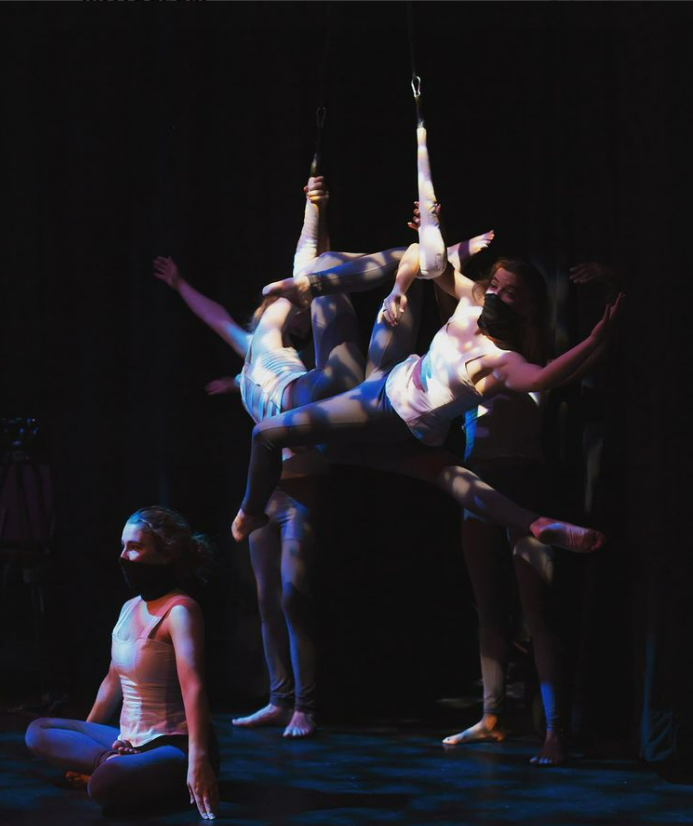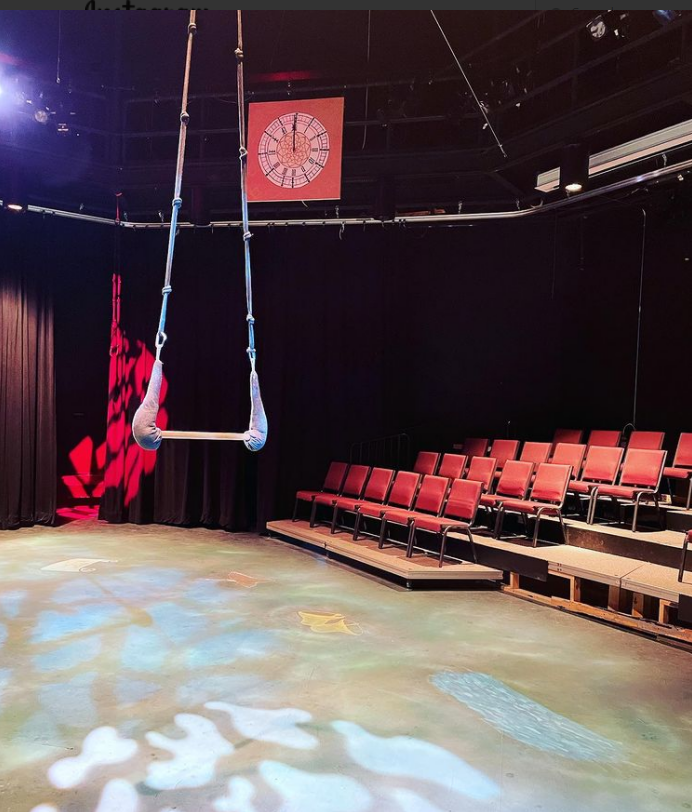
Western Theatre Company’s production of “Orlando” opened on Thursday, Nov. 4, with shows performed on Nov. 5 and Nov. 6. This weekend, “Orlando” returns for shows Nov. 11, 12, and 13 at 7:30 p.m. in the Taylor Studio Theatre. Tickets are sold on a “pay what you can” basis, and can be purchased via the Company’s website.
The theatrical production “Orlando” is based on a 1928 novel entitled “Orlando: A Biography” by acclaimed English author Virginia Woolf. Woolf’s book has been adapted for stage and screen numerous times throughout the 1980s and 1990s, including in a 1992 film starring Tilda Swinton as Orlando. Sarah Ruhl, a prolific playwright and essayist, first penned this stage edition of “Orlando” in 1998.
Ruhl’s “Orlando” features five acts, beginning in Elizabethan times amid the 16th Century. The second act involves a time jump into the 17th Century, beginning a process of century-leaping which continues after intermission into acts three, four, and five until the play’s conclusion in the modern era.
During Orlando’s travels throughout five centuries, they undergo a transformation into a woman, engage in a number of relationships (including a tryst with Queen Elizabeth I herself), and undergo a process of self-exploration, spurred by her new identity. “In a nutshell, the play is about an immortal trans woman who goes through time and writes a poem about an oak tree, while also getting into many love affairs,” said senior theatre student River Knight with a chuckle.
Western’s version of Orlando features eight performers, seven of which are predominantly “chorus” members who act as narrative guides for the audience. The actors serving as chorus members also branch off into their own roles, large and small (including a cohort of Orlando’s love interests and admirers). The eighth performance, of course, is the titular Orlando, played by Daelyn Vaughn.
The Western Theatre Company held auditions for “Orlando” back in September, and rehearsed in the evenings throughout October. With roughly five weeks to get ready, the actors had to balance learning the intricate art of dance on the trapeze (a fixture of Ruhl’s play) with the typical memorization of their lines and development of their characters.

“Because it’s this play that’s got this great poetry in it, and it’s about magic and transformation, the whole entire play takes place on the low-flying trapeze”, notes Professor Steven Cole Huges, an Assistant Professor of Communication Arts who directs Western’s Theatre Program.
The utilization of low-flying trapeze for storytelling was a selling point for both the actors and technical crew, and now for the audience. Professor Hughes learned the art of low-flying trapeze in graduate school, and was eager to pass that knowledge along to students.
Last spring, he made the practical decision to sync up a fall course in the discipline with the production of “Orlando.” Seven of the eight cast members are in that course currently, and eagerly anticipate their weekly aerial dance sessions, which can feel an awful lot like flying. “I have a pre-planned workout every week that I actually have fun in,” said Knight.
Professor Hughes has a background in writing, performing, and directing theatrical productions, largely with the Denver Performing Arts Center, but notes that Orlando now holds the distinction of being the only play he has ever directed twice. “[Orlando is] a big metaphor for finding out who you are in this world, and transformation, and the pursuit of both art and love, and how both those things, art and love, should be secondary to self-discovery and self-love,” Hughes said.

Orlando’s relevance to modern society, with its focus on gender roles and norms, as well as the pursuit of self-actualization and the search for identity, is something the cast and crew discussed during the play’s development. Hughes sees “Orlando” as particularly relevant in an era where discourse around gender, equity, and oppression can be found nearly everywhere you look.
River Knight highlighted a concept that arises throughout the play, known as the “spirit of the age,” a key theme of the production: “The ‘spirit of the age refers’ to what is seen as normal by society during their time period. Throughout the whole time [in the play], Orlando is trying to figure out where they fit in [with]in the spirit of the age.”
Knight, who made the switch from English major to Theatre after performing in Shakespeare’s “A Midsummer Night’s Dream” with the Western Theatre Company in 2020, also resonates profoundly with the play. “I’m a trans man, so this is a huge piece of representation,” adds Knight, who notes that a play can effectively convey ideas about gender and society more widely and easily than other forms of media, like Woolf’s original novel, that require a larger time expenditure.
Knight is afforded the opportunity to play a variety of roles throughout the production, including the Archduke and Archduchess (same character but in different acts), a lawyer, and a Russian seaman, which he cites as his personal favorite.
Joining Knight in the chorus is Jensen Hill, a senior studying Communications with a Theatre emphasis. Hill is active in both the Western improv scene and its theatrical productions. His engagement with Western Theatre Company included acting in outdoor performances of “Love” and “Almost, Maine” last summer.
Like many of the other cast members, Hill has been working to support the technical side of the production, putting in extra hours to assist with lighting and other behind-the-scenes work. Since the play is set on the trapeze, set decoration is rather minimal, but the cast and crew did pitch-in on a painting project. One of Hill’s characters is a man named Marmaduke Bonthrop Shelmerdine, who Hill notes is both “a gentleman and a scholar”. Shelmerdine appropriately enters the world of “Orlando” on horseback.
Putting on a play of this scope would be impossible without a highly competent technical team behind the curtain. Overseeing the play’s technical production aspects is Professor Wally Eastland, who serves as both Technical Director and Designer of Theatre, as well as a Lecturer in Communication Arts. Fusing together the realm of technical operations with the actors going about their roles is the tall task of the stage manager.
For “Orlando”, the role of stage manager has been assumed by Kacy Olmsted, a freshman in her first year at Western. Olmsted had originally volunteered to be an assistant stage manager. “We said ‘could you step up into being the stage manager, and we’ll guide you through the process’…and she has done it so well,” said Hughes, who added, “We kind of threw her into the fire, and she has responded so commendably.”
Olmsted is studying English and Theatre, and is hoping to fill out a well-rounded theatre résumé that includes roles in acting, technical production, and directing back in high school. “I pretty much make sure that everything doesn’t catch on fire,” Olmsted notes of her current role, which demands a locked-in mental focus throughout rehearsals and performances.
As stage manager, Olmsted is responsible for ensuring that lighting and sound cues go off without a hitch, and coordinating the flow of the production. Olmsted notes that early on, she simply took notes of where the actors would go and when, getting a sense for the play’s timing. Now, the transitions between scenes and acts are incredibly fluid, thanks to well-executed lighting cues that defy the conventional curtain-drops and hard-resets often seen between scenes and acts in other plays.
Olmsted also finds special meaning in “Orlando” as a collegiate theatrical production. “It’s a story of growth as a human, and discovering who you are, and discovering your identity. And especially at this time when you’re in college, [that] is something we can all relate to.”
“Orlando,” is a story about societal influences and expectations on an individual’s sense of self, particularly in the realm of gender norms and roles. The cast and crew have wrestled with these themes, updated from Woolf’s 93-year-old novel, and derived takeaways and meanings for their own lives.
For Professor Hughes, this is precisely the role that theatre should play in society. “Theatre is for people who are lifelong learners. If you like to experience a new thing every few months throughout the year, that’s what we do. We put on four plays a year, every play is a new world, a new set of characters, and a new set of challenges,” he said.
For Western Theatre Company, the exploration and worldbuilding will continue in the spring with two more productions. The group will put on “The Wolves,” written by Sarah DeLappe and first produced in 2016. The play features an all-female cast and is centered on the discussions amidst a youth soccer team in suburban America.
For their spring musical, the Company will perform an adaptation of the 1998 movie “The Wedding Singer,” a comedy starring Adam Sandler and Drew Barrymore. The musical version premiered in 2006 on Broadway, and was nominated for a Tony Award for Best Musical.
Stayed tuned for more updates on Western Theatre Company’s productions.

